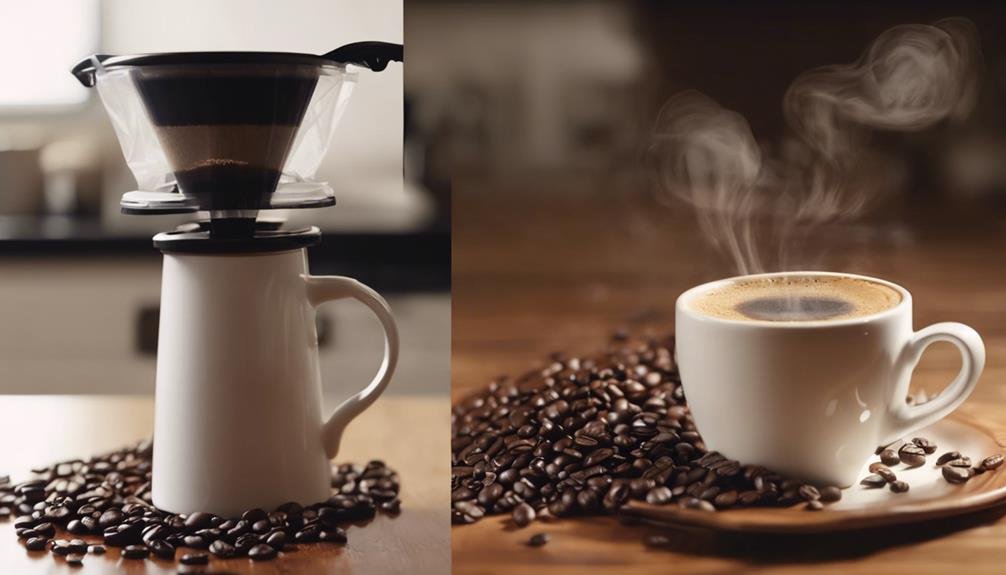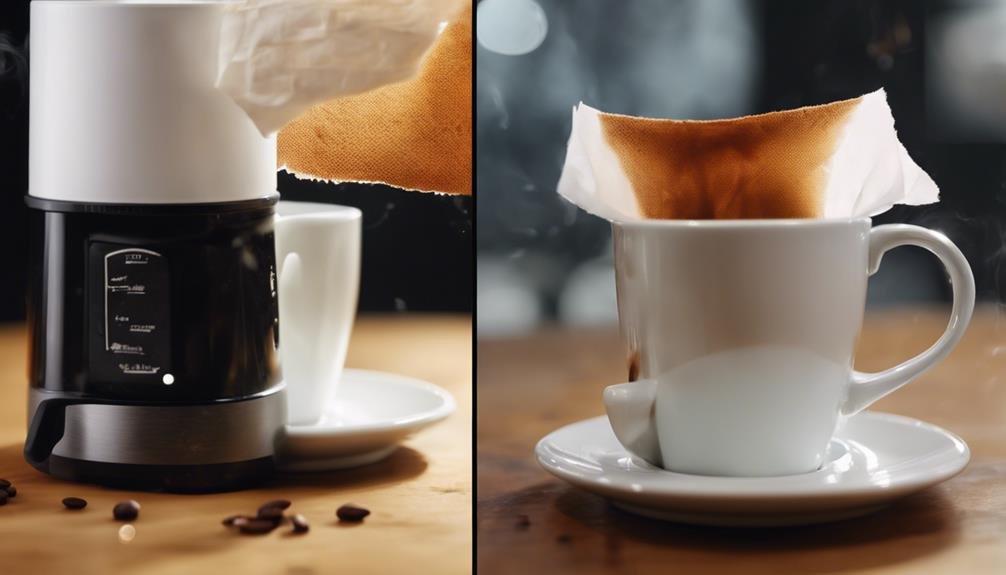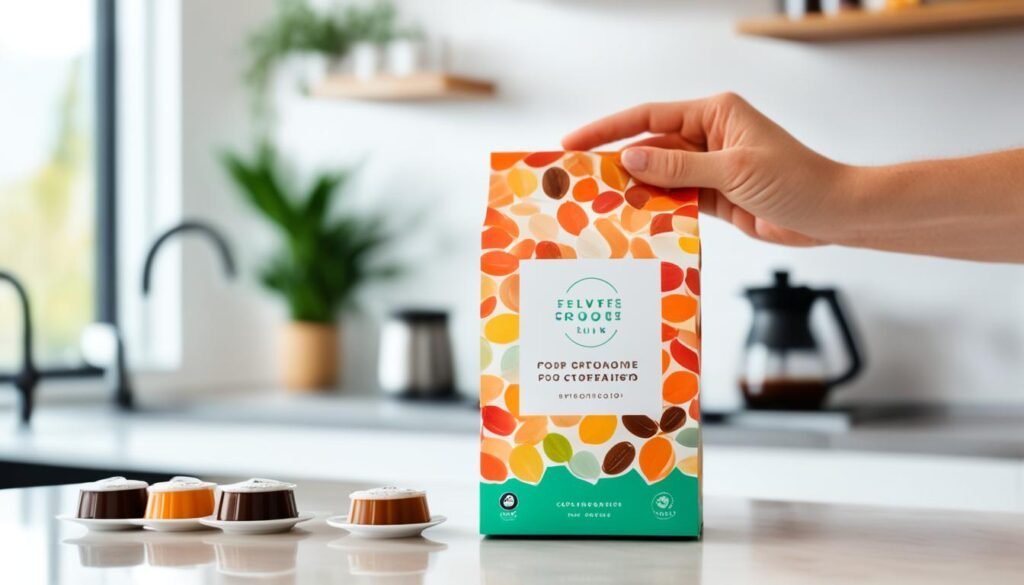When comparing paper towels to coffee filters, there's no clear winner. Paper towels can be a quick fix when you're out of filters, offering accessibility and cost-effectiveness. However, they come with potential drawbacks like durability issues and possible chemical concerns. Coffee filters, on the other hand, are specifically designed for brewing, providing better taste and reliability. While paper towels can work in a pinch, they're not ideal for regular use. Consider exploring reusable alternatives like cloth filters or metal sieves for a more sustainable option. Your choice ultimately depends on factors such as convenience, taste preferences, and environmental impact. To make an informed decision, it's worth examining each method's pros and cons in detail.
Paper Towel Coffee Filtering Benefits
Coffee lovers in a pinch can turn to paper towels as a surprisingly effective alternative to traditional coffee filters. This method offers several paper towel benefits that make it a viable option when you're out of regular filters.
To begin with, you likely already have paper towels on hand, making them easily accessible. They work similarly to standard filters, allowing you to brew your morning cup without much hassle. Additionally, this approach is cost-effective filtering at its simplest, as you're using an item you've already purchased for other purposes.
The process is straightforward: line your coffee drip basket with a paper towel, add grounds, and pour hot water over them. While not a long-term solution, this method can save the day when you're in need of a caffeine fix and don't have traditional filters available.
Drawbacks of Paper Towel Filters
Despite its convenience, using paper towels as coffee filters comes with several drawbacks you should consider before brewing.
First, there are potential health concerns. Paper towels often contain chemicals like glue and bleach, which may leach into your coffee. The long-term effects of consuming these substances are unknown, making it a risky choice for regular use.
Durability issues are another significant drawback. Paper towels aren't designed to withstand hot water and coffee grounds, making them prone to tearing during the brewing process. This can lead to grounds in your cup and a messy cleanup.
Additionally, the paper material may impart an unpleasant taste to your coffee, affecting its flavor profile. While paper towels can work in a pinch, they're not ideal for everyday use.
Consider investing in proper coffee filters or exploring other alternatives for a better brewing experience.
Using Paper Towels as Filters

If you're in a pinch and need to brew coffee without a proper filter, using a paper towel as a makeshift filter is possible with a few simple steps.
First, line your coffee drip basket with a paper towel, ensuring it's securely in place. Add your desired amount of coffee grounds, then pour hot water over them as you normally would. Let the water filter through the paper towel and into your cup.
While this method can provide you with a morning cup of coffee, it's important to take into account paper towel sustainability and taste profile. Paper towels aren't designed for long-term use as filters and may contain chemicals that could affect your coffee's flavor. Additionally, the taste profile might include a slight paper or chemical taste.
If you choose this method, be aware that it's a temporary solution and not ideal for regular use.
Alternative Coffee Filter Options
While paper towels can work in a pinch, you've got several other options for brewing coffee without traditional filters. Reusable alternatives offer sustainable options that can save you money and reduce waste in the long run.
One popular choice is a reusable tea bag. Simply fill it with coffee grounds, seal it, and steep it in hot water. This method avoids any potential paper taste and is easy to clean.
Another eco-friendly option is a mesh sieve. Place your coffee grounds in a glass, add hot water, let it sit, and then pour through the sieve. This zero-waste method is perfect for those looking to minimize their environmental impact.
Clean cloths can also be used similarly to paper towels, but be cautious of potential chemical tastes from detergents. Each alternative has its pros and cons, so experiment to find what works best for you.
Choosing Your Coffee Filtering Method

With so many options at your disposal, choosing the right coffee filtering method comes down to your personal preferences and priorities. Consider the following factors when making your decision:
| Factor | Consideration |
|---|---|
| Taste | Does the method affect flavor? |
| Convenience | How easy is it to use and clean? |
| Sustainability | Is it eco-friendly? |
Different brewing techniques can impact your coffee's taste and strength. If you're concerned about sustainability practices, reusable options like cloth filters or metal sieves might be appealing. However, if convenience is your top priority, disposable filters or paper towels could be more suitable.
Remember that each method has its pros and cons. Paper towels may be readily available but could impart a chemical taste. Traditional filters are reliable but create more waste. Experiment with various techniques to find the one that best suits your needs and aligns with your values.
Conclusion
When it comes to paper towels vs. coffee filters, you've got options. While paper towels can be a quick fix in a pinch, they're not ideal for regular use. They may affect taste and potentially introduce unwanted chemicals into your brew.
Traditional coffee filters remain the gold standard for consistently great coffee. However, if you're caught without filters, paper towels or other alternatives can save the day.
Ultimately, the choice is yours—just don't let a lack of filters leave you high and dry.












